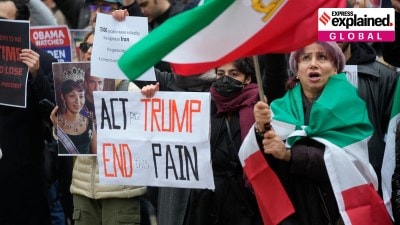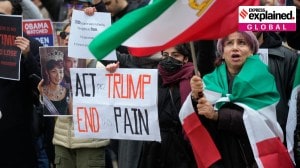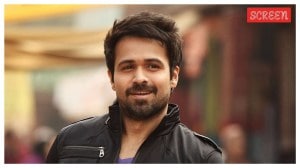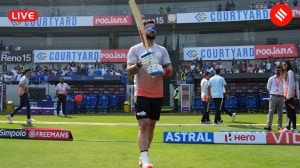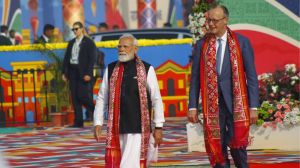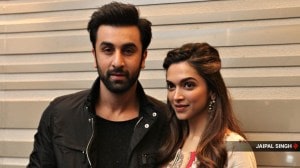The Hindu Bomb
Now I have become death, destroyer of the worlds-- J. Rober Oppenheimer, father of the Atomic Bomb quoting from the Bhagwad Gita when he saw...

Now I have become death, destroyer of the worlds
8212; J. Rober Oppenheimer, father of the Atomic Bomb quoting from the Bhagwad Gita when he saw the first nuclear explosion
Egypt8217;s gonna get one too
Just to use on you know who
So Israel8217;s getting tense
Wants one in self-defense
The Lord8217;s our shepherd says the psalm
But just in case8230; we gotta get the bomb!
8212; American signer Tom Lehrer, spoofing proliferation in the song quot;Who8217;s Next?quot;
The bad news is India is getting bashed, pilloried, chastised, condemned, castigated. The good news is India is being talked about.
After the last week8217;s cataclysmic 8212; in more ways than one 8212; nuclear tests, one thing is certain. New Delhi can8217;t complain of neglect anymore. It has returned to the centrestage of the world. With a bang.
Overnight, think tanks in the United States 8212; which many suspect number more than the water tanks and battle tanks in the country 8212; have India on their mind. After years of being sidelined, Indiaprogrammes and India scholars are once again getting a dekko. In the last few days, edit and op-ed pages of American newspapers have been full of articles relating to India; talking heads are pontificating on the tests; and experts have mushroomed like8230; well, mushrooms.
More has appeared on India in the last ten days than in the last year. And that includes the Golden Jubilee of Independence.
Just how badly the region was put on the backburner is evident from the fact that the prestigious Brookings Institution has a visiting fellow specialising in the region for the first time in 20 years. quot;I hope I will get plenty of consultancy now,quot; joked Prof. Stephen P. Cohen, whose choice was made before the tests and who will join Brookings this fall. A discussion on India8217;s test hosted by Brookings on Monday attracted a packed audience. Academics and journalists who would not sniff at quot;India: A Sleeping Giantquot; came panting to listen to quot;India8217;s Tests: How to limit the fallout?quot;
Scholars say New Delhi had onlyitself to blame for the long neglect of India on the academic circuit. For years, western and particularly American scholars were viewed with deep suspicion by successive Indian governments. Visas were denied, visitors were not allowed to travel to certain parts, and scholars were generally treated shoddily starting from India8217;s appalling quot;internationalquot; airports itself. Result: many scholars switched off India, preferring to take up more appealing areas like China, Russia, Vietnam and Korea.
But India8217;s return to centrestage has been coloured by acid commentary about the virulent strain of ultranationalism that appears to have infected the Indian tests. The atom, someone said sarcastically, is a fundamental particle; perhaps more fundamental than you8217;d guess.
Already, the first whispers of the Hindu Bomb is being heard. Many writers and analysts have attributed the tests as much to the BJP8217;s domestic political compulsions and instinct for survival than India8217;s security needs or strategic foresight. Theresult: A spate of editorials, analyses and cartoons with a quot;Hinduquot; touch.
Newspapers have spoken of India8217;s quot;Hindu Prime Ministerquot; offering his home minister quot;Hindu sweetsquot;. Many articles speak of a recidivist, revanchist mood, flogging the usual cliched images8230; snake charmers, fakirs, sati and Kipling. The weekend New York Times story on India was accompanied by a reproduction of a painting of Shiva, the creator and the destroyer 8212; with five heads, ten arms and a garland of skulls.
Suddenly the Islamic Bomb has taken a backseat.
BJP activists rubbish such characterisation, pointing out that even Robert Oppenheimer, the man regarded as the father of the American tests, quoted from the Bhagwad Gita soon after the test. quot;Does that make him a Hindu or any less secular?quot; one Overseas BJP supporter argued. They also point out that the man credited with pushing for overt nuclearisation of India 8212; A P J Abdul Kalam 8212; is in fact a Muslim, though in India8217;s quot;best secular traditionquot;, healso reads the Gita, plays the Rudra Veena and has praying rights at the Rameshwaram Temple.
But as analysts search for a rationale behind India8217;s test, the religious angle seems to be most inviting for a region that has long fought wars over the religion and was partitioned over the issue. One commentator, happily blurring the line between Indians and Hindus, huffed: quot;Indians hope their nukes will both blow away any doubts about India8217;s role as a great power, and end its long, painful inferiority complex towards sneering westerners, and rampant Muslims. Hindus will finally get respectquot;.
The quot;Hinduisationquot; of the tests has dissed a lot of Indians who support the government8217;s move but who are distressed that the achievement is being hijacked by the fundamentalist elements of the BJP. quot;Being painted as a Hindu state is the last thing we want. How does that make us any different from Pakistan?quot; Parthiv Shah, a Virginia student, fumed, sending to the quot;saffron looniesquot; a caustic greeting that isnow becoming a part of e-mail correspondence here: quot;Thanks a megaton 8212; for turning the test into amela.quot;
- 01
- 02
- 03
- 04
- 05


